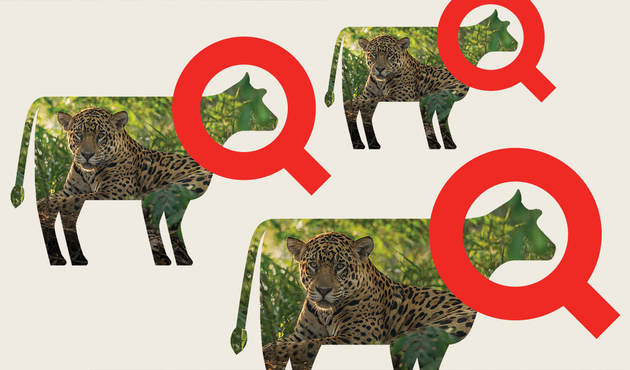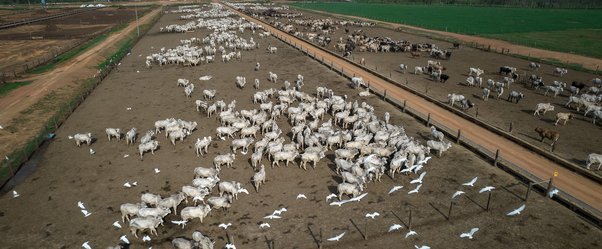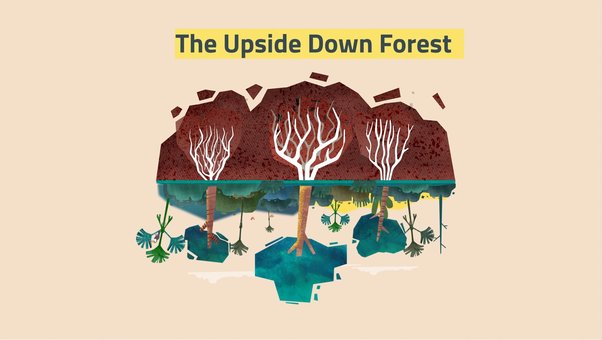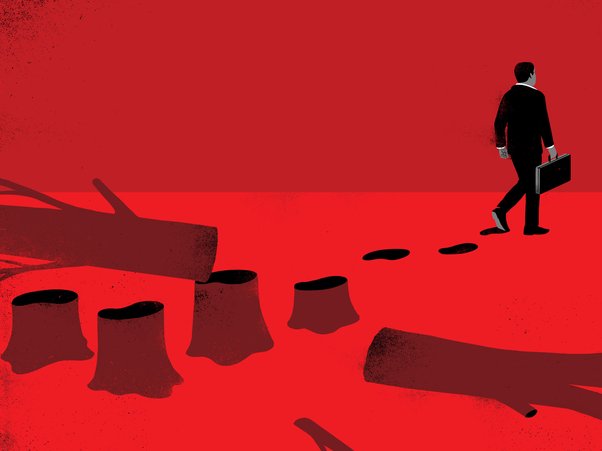The jaguar's future looks increasingly uncertain as Big Agribusiness tears down its home in Brazil's tropical forests to make way for cattle ranching
- Industrial agriculture, especially cattle ranching, is accelerating biodiversity loss in Brazil – threatening species such as the jaguar and undermining global climate goals.
- In Brazil, analysis by Global Witness can reveal that more than 27 million hectares (ha) of the jaguar's original wild habitat has been converted into agricultural land — an area larger than the UK.
- A single supplier to the world’s largest meat processor, JBS, has destroyed over 1,200ha of jaguar habitat in a protected area in Brazil over 10 years.
- Most of JBS’s suppliers which overlap with jaguar territory in two states have broken environmental laws in the past five years.
- Ahead of COP30 in Brazil, world leaders must enforce supply chain rules that protect people, nature and hold financial institutions accountable – or risk missing the 2030 deadline to end forest loss.
Jaguars vs cows: The biodiversity crisis under JBS’s shadow
Download Resource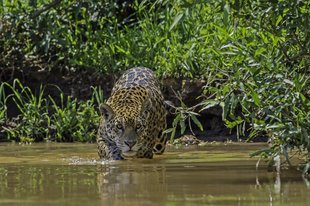
In a fight between a jaguar and a cow, who do you think would win? If you guessed South America's most powerful predator, you’d be wrong.
As industrial agriculture like cattle ranching destroys Brazil’s forests, it also threatens jaguars – a keystone species vital to biodiversity and climate stability.
This new investigation reveals that JBS, the world's largest meat processor, is one of the actors behind this crisis.
From 2013 to 2023, a single JBS supplier razed more than 1,200ha of forest across jaguar habitat in a protected area of Brazil.
But the company’s supply chain is particularly destructive to jaguar territories in two states: Pará and Mato Grosso.
In both states, an analysis of ranches overlapping jaguar territory found that 75% of farms Global Witness identified as being in JBS’s supply chain appeared to violate Brazil’s environmental laws between 2018 and 2023.
Jaguars are losing the fight to Big Agribusiness
As top predators, jaguars play a crucial role in maintaining healthy ecosystems by controlling disease and ensuring that certain species populations do not grow too large and disrupt the food chain.
In Brazil, the overall picture is one of agriculture eating into wild habitats, with recent research suggesting jaguars avoid agricultural land on their territory.
Analysis by Global Witness found over 27 million ha of jaguar habitat – an area larger than the UK – had been converted to agricultural land in the states of Mato Grosso and Pará as of 2023.
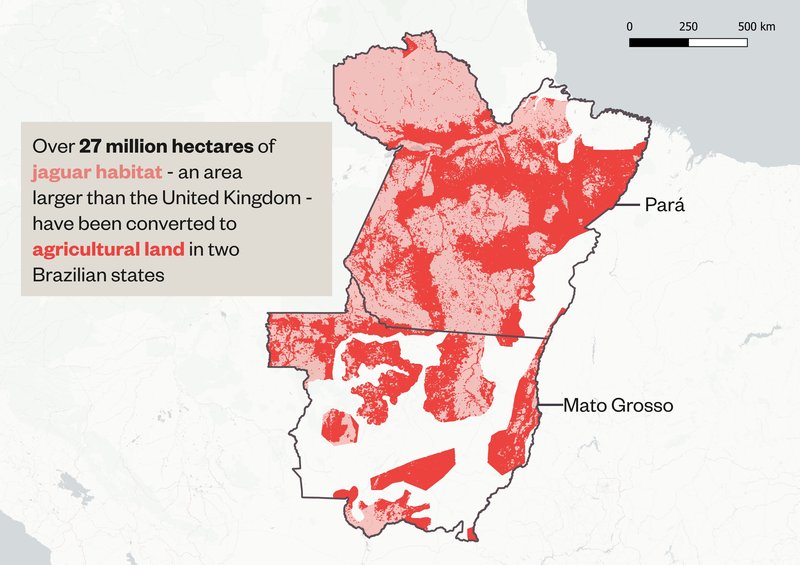
A lack of historic data makes it difficult to know exactly when all of this land conversion took place. Nonetheless, deforestation in Brazil has been immense in the past decade, despite some recent reductions in rates of forest loss.
To calculate recent agricultural expansion and forest loss in the jaguar territory, Global Witness analysed data from 2014 to 2023 from the non-profit organisation MapBiomas, which monitors land use change in Brazil starting in 1985.
Jaguars are a keystone species. When their territories are destroyed, the entire ecosystem suffers
Between 2014 and 2023, Global Witness detected more than 5 million ha of forest loss on jaguar territory in the two states – 89% of it without the required legal permits.
In the same period, agricultural land in jaguar territory expanded by more than 5 million ha.
While some of this clearance overlaps, it is not certain that all of this new agricultural land was previously forest.
Deforestation driven by the expansion of industrial agriculture and weak supply chain monitoring are accelerating biodiversity loss. This destruction pushes species like the jaguar towards extinction and undermines global climate goals.
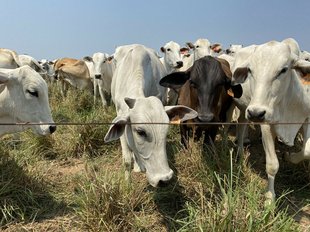
“We decided to investigate the loss of jaguar habitat driven by industrial agriculture because jaguars are a keystone species. They play a crucial role in stabilising ecosystems and maintaining biodiversity in areas such as the Amazon and Cerrado. When their territories are destroyed, the entire ecosystem suffers," said Marco Mantovani, a Global Witness investigator leading the data analysis.
Experts warn that the extinction of apex predators like the jaguar could trigger catastrophic ripple effects, pushing plant and animal species towards extinction.
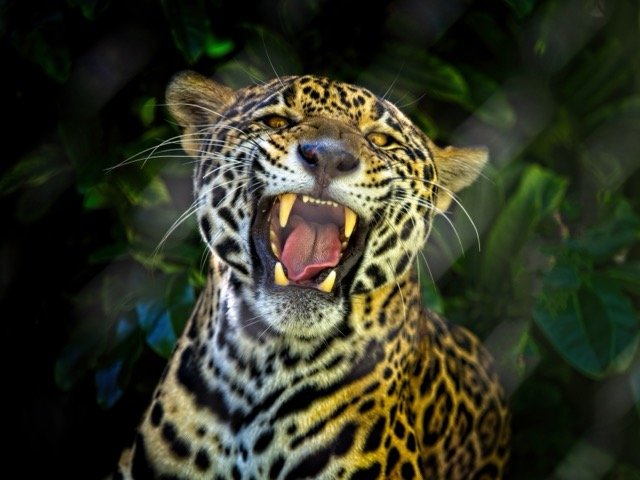
The jaguar holds deep symbolic significance in many Latin American Indigenous cultures, embodying the strength of nature and serving as a guardian of the rainforest. But today they live in fragmented patches of forest between Mexico and Argentina, in areas encompassing only half of their historic range.
In Brazil, the species is under threat from habitat loss and has already been virtually wiped out in some areas, including the Atlantic Forest and the Caatinga.
Jaguar populations are in decline, with the International Union for Conservation of Nature (IUCN) classifying the big cat as Near Threatened on its biodiversity Red List. An estimated 1,422 jaguars were killed or displaced in the Brazilian Amazon between 2016 and 2019, according to a 2021 study by the Conservation and Science Practice journal.
Giulia Bondi, Global Witness’ EU Senior Campaigner, said: "Decision-makers in the EU and beyond must stop backpedalling on the laws needed to end forest loss by the time they turn up to COP30 in the Amazon.
"Governments have committed to stop all forest loss by the end of the decade, which means they need to move quickly to introduce new laws that cut off the financial lifelines enabling irresponsible companies that are fuelling this crisis."
A serial offender in JBS’s supply chain
To uncover the relationships between agriculture, deforestation and habitat loss, Global Witness began investigating company supply chains.
One farm Global Witness identified as being in the supply chain of meatpacker JBS, the Canoeiro farm, in Cocalinho, Mato Grosso state, has been fined nearly $576,000 (R$3.35 million) for the illegal clearing or damaging of forest and other related activity. The farm’s owner as of 2024, MFX Investimentos e Participacoes, is an investment firm based in Goiás state.
Analysis by Global Witness found the farm cleared more than 1,200has of protected jaguar territory between 2013 and 2023 in an area called APA Meandros do Araguaia – a unique ecological haven for wild animals such as jaguars, deer, birds, turtles, and other species.
The reserve is nestled in a mix of old-growth forest and savannas spanning the Mato Grosso, Goiás and Tocantins states. Unauthorised deforestation and the use of fire in this area are illegal.
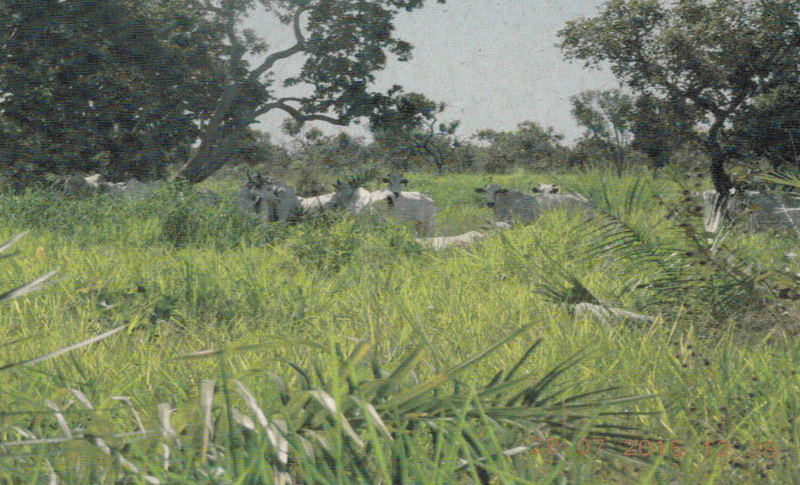
Cattle observed grazing on embargoed land at Cocalinho Farm, according to a 2015 environmental fine issued by ICMBIO and accessed by Global Witness. ICMBio / Global Witness
Despite receiving multiple fines and embargoes between 2013 and 2022, the farm received another fine for continuing to clear the forest in 2023.
Documents analysed by Global Witness reveal that animals raised on this ranch were transferred to a nearby property owned by the same individuals. From there, they were sold to other farms, which supplied cattle to JBS slaughterhouses on two occasions between 2019 and 2022.
MFX was contacted for comment but did not reply. JBS said in a statement that only one of the farms identified by Global Witness to be purchasing from MFX is still part of its suppliers list, and that the other was formerly a supplier but has since been blocked by the company.
The movement of cattle raised on deforested land to “clean” farms is known as “cattle laundering”. It is one way that deforestation-linked cattle products can enter the marketplace, exploiting a loophole in JBS’s monitoring systems, which mostly track direct suppliers while overlooking indirect ones further down the supply chain.
A systemic issue
JBS has been implicated in similar cattle laundering allegations multiple times before.
A 2024 investigation by Global Witness with the Centre for Climate Crime Analysis (CCCA) and Profundo revealed that between 2018 and 2023, nearly 8,000 cattle raised illegally within Brazil's Apyterewa Indigenous territory entered JBS's supply chain likely through a cattle laundering scheme.
British bank Barclays earned $1.7 billion from financing JBS during that time, surpassing more than 30 other global financial institutions bankrolling the meatpacker.
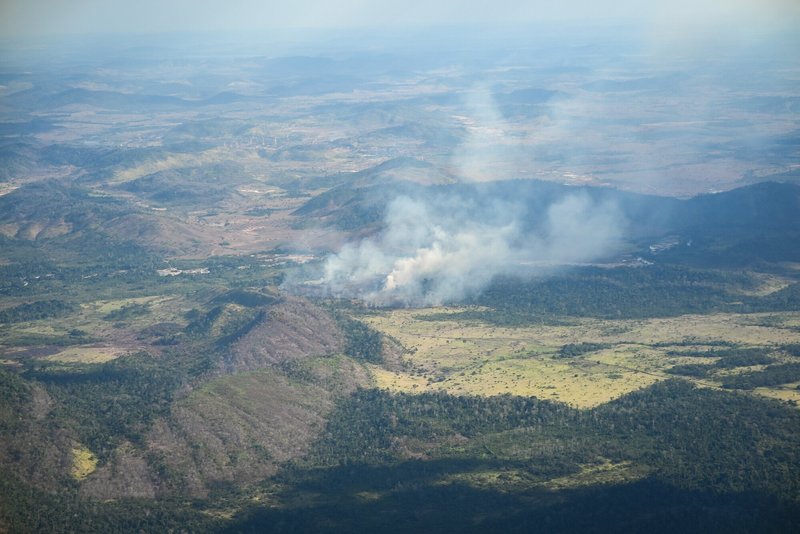
Fires spotted in 2024 by Global Witness inside the Apyterewa Indigenous territory, in Para state. Cattle illegally raised inside the reserve ended up in JBS's supply chain. Cicero Pedrosa Neto / Global Witness
JBS’s frequent failure to adequately monitor its indirect suppliers shows why strong laws are still needed to keep deforestation out of supply chains.
Buying cattle from farms with deforestation, even indirectly, violates JBS’s environmental commitments.
Beyond this single supply chain, Global Witness analysed cattle transport records to map JBS’s direct supply chain between 2018 and 2023 in the states of Pará and Mato Grosso. Properties which overlapped with jaguar territory were identified, and the data was cross-referenced with property records available through the government's Rural Environmental Registry (SICAR).
This official data shows that 75% of farms based in jaguar habitat that Global Witness identified as being in JBS’s supply chain had less forest remaining on their property than legally required under Brazilian law. Jaguars and other wildlife need forest and vegetation to live in, hunt and travel through.
JBS has pledged to eliminate illegal Amazon deforestation from its supply chain – including the suppliers of its suppliers – by 2025, and in other Brazilian biomes by 2030.
The company has also set a net-zero goal by 2040. But in early 2025, its global chief sustainability officer Jason Weller said that the net-zero target was merely an "aspiration", admitting "it was never a promise that JBS was going to make this happen."
JBS strongly refuted the overall findings of Global Witness’s analysis of official data and documents which were sent to the company and discussed in detail.
JBS's office in São Paulo, Brazil. JBS Press Room / JBS
In a statement sent by email JBS told Global Witness that the 75% figure “is clearly overstated," that many of the farms analysed were not in its “supplier base” and that the figures analysed drew from a “limited sample."
At the time of writing the company has not, however, provided Global Witness with any evidence to substantiate its statements despite multiple requests.
JBS said that it does comply with Brazilian laws, agreements and policies governing cattle supply chains, including the “Beef on Track” protocol developed by the Brazilian Attorney General’s Office as the “standard protocol for cattle purchases in Brazil."
It also said that its supplier farm with trade links to MFX is compliant with the same laws, agreements and policies.
The company stated that that it is “dedicated to achieving zero illegal deforestation across its cattle supply chain in all Brazilian biomes where it operates by 2025” and that "this goal is essential and must be expanded."
Why COP30 must confront agribusiness-driven forest loss
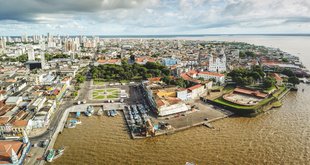
Belém, Pará – the gateway to the Amazon and the stage for COP30 – standing at the crossroads of nature and negotiation. Ricardo Lima / Getty Images
Brazil is set to host the UN climate summit COP30 in Pará in November this year. There, leaders will be held responsible for showing how they will realise the Glasgow Leaders’ Declaration on Forests and Land Use to halt and reverse forest loss by 2030.
Environmental groups including Global Witness have said leaders need to come to COP30 with clear plans to meet their deforestation targets, ensure forest defenders are included in climate negotiations, and make sure biodiversity action is covered.
Without stronger supply chain and finance rules, backed by tough penalties, businesses carrying out deforestation may drive iconic species like the jaguar to extinction
Global Witness is campaigning for key finance and consumer centres to adopt legislation that aligns the global economy with forest protection and the rights of local communities.
Reid added: “We cannot forget that financial institutions are still profiting from backing JBS. We’re calling on banks and asset managers headquartered in the UK, US, China and the EU to adopt due diligence regulations to ensure their investments are not fuelling forest destruction."
Read this page in
